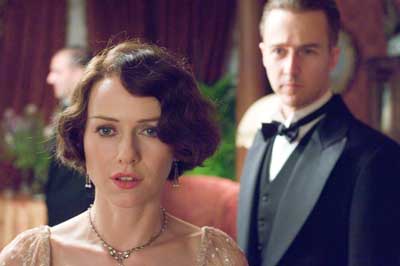Set in the 1920s, The Painted Veil tells about a period in the life of
Kitty (Watts, King Kong), a Londoner who
constantly is feeling pressured by her family to get married and leave the
house, now that she's getting up there in years. Tired of the harping
and feelings of inadequacy, she marries a young doctor of biology named Walter
Fane (Norton, The Illusionist),
who in the course of courting her, has fallen madly in love. Kitty
doesn't feel the same way, but he is the answer to all that has been bothering
her, so she consents to the marriage, eventually leaving with him to China in
order for him to continue in his career. Once there, Kitty engages in an
affair with another married British diplomat named Charlie Townsend
(Schreiber, The Manchurian Candidate),
and does feel actual love for the man, but is faced with conflict when Walter
finds out about the affair. Walter gives her an ultimatum: come with him
to a poverty-ridden village where a cholera epidemic is killing them at a
rapid rate, or get a divorce and be left with the shame and uncertainty that
this decision entails. When Charlie hedges his feelings in the end, the
choice is clear, as her apathy turns to misery, and boredom turns to
self-discovery, in one of the most forsaken parts of the world.
Like many period romances, a great deal of the film's assets reside in the
lush cinematography, beautiful environs, and elegant costumes, sumptuously
presented by cinematographer, Stuart Dryburgh (Aeon
Flux, The Recruit). The score by
Alexandre Desplat (The Queen,
Firewall) is subtle, but often stirring when
the situation calls for, sometimes reminiscent of the work of Philip Glass,
especially in his score for another recent Edward Norton vehicle, The
Illusionist. The direction by John Curran (We Don't Live Here
Anymore, Praise) is assured, taking modest chances in the overall feel of
the piece through the depiction of China as alluring, yet always dangerous.
Nyswaner's script fleshes out the original story to include a backdrop of
political unrest, further deepening the sense of urgency and despair that
would eventually lead to cracking the protective shell of a guarded man and
frustrated woman. There is an elegance and aesthetic beauty to the film
that plays very well to the type of drama that The Painted Veil is --
mysterious, romantic, and pessimistically bleak. From a craftsmanship
standpoint, it's difficult to imagine doing this story more justice.
Of course, most of the accolades will more rightfully go to the main actors,
Edward Norton and Naomi Watts (who also receive producer credits), for their
brilliant portrayals of two complex, flawed characters who must progress and
mature quite substantially, but naturally, in the course of this two hour
film. In both cases, they are award worthy, with Norton showing a deep
inner pain and inability to express his true feelings, though we know always
know what he's going through, while Watts, removed from the sheltered,
superficial life she once lead, finds out there is more to her world than
balls and flirtations, as well as more to the essence of love. Though
it's not always easy to see these changes, the characters at the end of the
film are quite different than the ones we're introduced to at the beginning,
although the world they were born into, as well as the one they are thrust
into, always seems to stay the same.
Although marketed as a romance, and it is in some ways, The Painted Veil
is more about a deeper sort of feeling that two people can have for one
another. While many love stories never delve much deeper than the
initial attraction and union of two people who must overcome obstacles to
finally come to equal terms, The Painted Veil differs by starting out
with an uneasy union, with characters that have many conflicting feelings for
one another at varying times, never quite able to come to a mutual
understanding of what they mean to each other. Looking at it in another
way, it could be called an anti-romance, as these characters were never
afforded a mutual interest, though they eventually form a bond that connects
them far more, and runs much deeper, than in stories that depict common
courtship. Two people can fail so miserably at romance can still find
love for one another, though their emotional frustrations prevent them from
being able to break through.
The Painted Veil is a beautiful film, visually and spiritually.
Gorgeously presented, emotionally resonant, and superbly constructed, it is a
subtle, poignant, and ultimately moving story of two people who start off by
giving up on past loves to explore a newfound life, but instead, end up giving
past lives in order to explore newfound love.
-- Maugham's novel has been previously adapted in The Painted Veil
(1934) and The Seventh Sin (1957).

